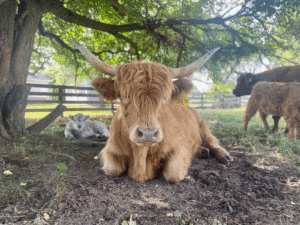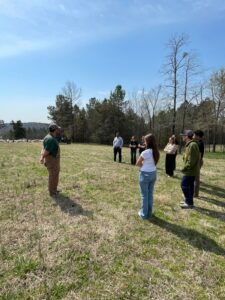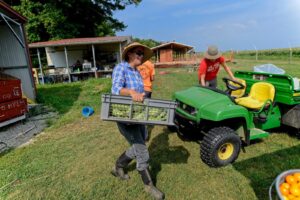A Deeper Dive Into Agritourism Ideas
go.ncsu.edu/readext?1070849
en Español / em Português
El inglés es el idioma de control de esta página. En la medida en que haya algún conflicto entre la traducción al inglés y la traducción, el inglés prevalece.
Al hacer clic en el enlace de traducción se activa un servicio de traducción gratuito para convertir la página al español. Al igual que con cualquier traducción por Internet, la conversión no es sensible al contexto y puede que no traduzca el texto en su significado original. NC State Extension no garantiza la exactitud del texto traducido. Por favor, tenga en cuenta que algunas aplicaciones y/o servicios pueden no funcionar como se espera cuando se traducen.
Português
Inglês é o idioma de controle desta página. Na medida que haja algum conflito entre o texto original em Inglês e a tradução, o Inglês prevalece.
Ao clicar no link de tradução, um serviço gratuito de tradução será ativado para converter a página para o Português. Como em qualquer tradução pela internet, a conversão não é sensivel ao contexto e pode não ocorrer a tradução para o significado orginal. O serviço de Extensão da Carolina do Norte (NC State Extension) não garante a exatidão do texto traduzido. Por favor, observe que algumas funções ou serviços podem não funcionar como esperado após a tradução.
English
English is the controlling language of this page. To the extent there is any conflict between the English text and the translation, English controls.
Clicking on the translation link activates a free translation service to convert the page to Spanish. As with any Internet translation, the conversion is not context-sensitive and may not translate the text to its original meaning. NC State Extension does not guarantee the accuracy of the translated text. Please note that some applications and/or services may not function as expected when translated.
Collapse ▲A Deeper Dive into Agritourism Ideas
Elena Wigglesworth (egwiggle@ncsu.edu)
NC State University Agricultural Business Management and Parks, Recreation, and Tourism Management
Agritourism can be a great way of increasing revenue on your farm as well as a way to help the community learn more about agriculture. Listed below are some unique agritourism ideas as well as their special considerations, pros, and cons. pros, cons, and special considerations. Many are versatile and can be stacked particularly with the seasons to create a strong agritourism program for your farm all year round. Additionally, spotlights featuring Laz E Hill Farm, Juneberry Ridge, Juneberry Education Foundation, and the NC State University Agroecology Education Farm provide examples and insights into these ideas and are denoted with an (*) in the list below.
This serves as a list for generating ideas. Before adding or updating any activities on your farm you should check your insurance policy to ensure it will cover the concept. You should also ensure that you hold the necessary permits and licenses. The best practice is to check with both your insurance agent and your lawyer before adding any activities to your farm.
For quick reference, the ideas are as follows:
- Mazes
- Petting Zoo/Animal Experience*
- U-Pick
- Educational Workshops
- Guided Farm Tours*
- Birthday Parties
- Naming Certificates
- Campsites
- Farm Stays*
- Open Picnic Times
- Weddings/Events
- Hosting Other Instructors*
- Farm to Table Events
Activity on Farm Descriptions:
-
Mazes
Mazes can be a fun way to attract visitors to your farm. Corn mazes are often designed using a computer and cut using a GPS guided tractor through a fully planted field while sunflower mazes are often planted according to the maze design, leaving the intended pathways free of seeds. Note that costs can vary greatly from farm to farm. Consider first, if you have enough land to host one, and other attractions that you may want to pair with the maze. Pros include promoting outdoor exploration and problem solving with the local community. Cons include limited operating season and safety concerns.
-
Petting Zoo/Animal Experience
From hosting all-year round events with dedicated animals to hosting a few open weekends in the springtime when you already have young animals on the farm, petting zoos have the benefit of being able to be held on a range of scales. Be sure to consider hygiene procedures, that you’re selecting naturally docile animals, and how you’ll communicate animal handling and safety with visitors and staff. Pros include being able to use animals you already have on the farm, meaning potentially low startup costs, and being able to educate the public about animal care and handling. Cons include the unpredictability of animals, possible increased stress for your animals, and potential for zoonoses (diseases that can be passed between animals and humans) to be spread.

A cow on a summer day at Laz E Hill farm in Haymarket, VA. Photo courtesy of Elena Wigglesworth.
Petting Zoo/Animal Experience Spotlight: Laz E Hill Farm in Haymarket, Virginia hosts “Touch and Brush” events by appointment with their Highland Cattle. For a fee, visitors can spend time petting and brushing the shaggy locks of Laz E Hill’s cattle. Visitors also get to take photos, learn about the history of Highland cattle, and ask questions.
-
U-Pick
U-Pick operations (where customers harvest the crop themself) are another versatile agritourism idea. Crops like apples, cherries, peaches, berries, pumpkins, flowers, and Christmas trees make excellent U-pick crops. Consider what other products you could sell to pair with your U-Pick crops. For example, pumpkin carving kits, pie crusts, Christmas tree stands, and flower vases could all pair with your U-Pick crops. A U-Pick operation provides the pros of reduced harvest labor, increased customer interaction, direct to customer sales, minimization of post-harvest processing, potential to sell lower quality products, and reduced equipment costs. Cons of U-Pick operations include an increased need for customer service labor, potential loss of yield due to unskilled harvesting labor, unpredictable weather leading to a loss of customers, and risk exposure (including hazards from farm equipment and animals if you have them) for customers.
-
Educational Workshops
The content of your workshop will depend on what your farm usually produces. If you have a flower farm, a flower drying or wreath making workshop may be of interest to customers. However, a workshop can also be centered around what your farm may need rather than what it produces. For example, if you need to build a shed, consider hosting a shed building workshop. You’ll have people paying to be the manual labor you needed to build your shed while teaching them a skill they can use themselves. Pros of hosting workshops vary depending on what content you’re teaching but generally include increasing public agricultural knowledge, ability to host visitors at times that are convenient for you, and the ability to limit the number of visitors your farm receives at a time. Cons can include high material cost and planning the workshops being a time intensive activity.
-
Guided Farm Tours
Farm tours can be a great way to engage customers on your farm in a personal way. Consider that you will need to live in an area with enough agritourism interest for this to be profitable and iif your time is better spent elsewhere or if you could hire a tour guide to lead the tours instead. Make sure to have extra products available to sell to those who attend your tour including both farm-grown produce and additional products like farm T-shirts or hats. Pros include helping to educate the community about how their food is produced. Cons include tours being potentially time consuming as well as logistics and safety concerns.

A farm tour hosted by Juneberry Education Foundation. Photo courtesy of Juneberry Education Foundation.
Guided Farm Tours Spotlight: Juneberry Education Foundation, a nonprofit which partners with Juneberry Ridge in Norwood, North Carolina, uses the facilities of Juneberry Ridge to host farm tours that focus on education for students from elementary through college level. Their goal with these tours is to get as many students as possible out to experience the farm, usually on school field trips. The tours “loosely” follow local curriculum guidance and are curated to each group based on size and how long they’d like to stay at the farm. “Many students who come to Juneberry have never been on a farm before. They get to see pigs, chickens, sheep, and livestock dogs,” explained Danielle Rushing, the Education Director for Juneberry Education Foundation. The majority of their tours are low cost or free as Juneberry Education Foundation is grant funded. The nonprofit switches to providing summer camps and a college internship program when the school year is not in session.
-
Birthday Parties
Birthday parties can be a fun addition to your agritourism lineup. Consider what activities you can offer to party attendees like pony or tractor rides, grooming the horses, playing with the goats, or having a campfire. You’ll also want to have a party room or picnic space. Consider that even if you have your party hosts bring the food and beverages, you may need to provide refrigeration for their items while they participate in other activities on the farm. Pros include connecting local kids with agriculture. Cons include a potentially inconsistent market and a high amount of logistics coordination.
-
Naming Certificates
Naming certificates are a simple way to bring in extra money and engage local community members. Simply let community members pay to name your animals in exchange for a certificate with the animal’s name. No animal is too small for this. Certificates can be sold online or at an event, just be sure to share any naming guidelines ahead of time. Pros include low necessary costs and resources and high community engagement. Plus, you’ll likely gain loyal visitors who want to come back and visit the animal they named. Cons include potentially odd animal names.
-
Campsites
Campsites are an interesting way to bring more visitors to your farm. Consider that you will need to provide certain infrastructure such as toilets, showers, and water. You’ll also need a safe place for tents to be pitched or trailers to be parked. You can provide a lot of extra add-on options to go with your campsite too. For example, firewood, rentable tents, food, or animal-related experiences are easy add-ons. Campsites provide the pros of being relatively low maintenance once set up and of providing your visitors a truly unique experience. Cons include infrastructure set up and continual logistics coordination.
-
Farm Stays
Farm stays are a more formal way to host guests on your farm. A farm stay can take multiple formats, from an on farm rental unit that is continually rented out, to specific weekends when multiple groups of guests are hosted on the farm. You can choose to structure these stays very loosely with the expectations that visitors will come and go from your farm, or more rigidly with the expectation that guests will participate in on-farm experiences for the duration of their stay. Pros of farm stays include engaging the local community in agriculture and nature, and a flexibility of formats to suit your farm. Cons include staffing concerns as you may only need staff when you have guests, and the initial cost of investing in guest accommodations.

Lettuce. Juneberry Ridge’s farm stays feature “Farm-to-Fork” dinners which incorporate crops grown on the farm. Photo courtesy of the NC State photobank
Farm Stays Spotlight: Juneberry Ridge in Norwood, North Carolina currently hosts two and three-night farm stay weekends. The weekends focus on wellness, relaxation, and connection to nature with itineraries that include things like meditation, forest bathing, a mixology class, a greenhouse workshop, yoga, and “Farm-to-Fork” dinners. Danielle Rushing, the Education Director for Juneberry Education Foundation which works closely with Juneberry Ridge on some initiatives shared, “A lot of it is trial and error. The farm stays is the thing that they have tried that has gone well so they’ve expanded their program.” She explained that finding staff willing to work on semi-consistent weekends can present a challenge, but that farm stays practically “market themselves,” with happy guests eagerly sharing their experience with others. She said that guests leave the weekends feeling relaxed, rejuvenated, and connected with nature, as well as praising the friendliness of the staff at Juneberry Ridge.
-
Open Picnic Times
Open picnic times are a super simple way to bring visitors to your farm. It can be as simple as opening your farm for families to bring lunch to on the weekends. You can provide picnic tables and/or blankets or let visitors know that they should bring their own. You can charge visitors a small fee by car or let visitors picnic for free but offer extra items for sale like snacks, drinks, pony-rides, games, or t-shirts. Consider partnering with other local businesses like food trucks or ice cream trucks for these events. Pros of open picnic times include limited planning, set-up, and investment. Cons include communication needs. Make sure visitors know when and where your farm will be open and that it is not open all of the time.
-
Weddings/Events
Hosting events on your farm can be a profitable endeavor, especially if you have extra spaces like a minimally used barn. Consider though, that especially for upscale events like weddings, hosts and guests will expect a high-quality space and experience. You’ll need to make sure that the farm is adequately organized and cleaned before each of these events. Particularly if these events will take place outdoors, you should also consider what to do in case of bad weather. Do you have the space to host these weddings/events indoors? You should also consider where a potentially high number of farm visitors will park. Pros of hosting weddings/events include potentially high profitability. Cons include high initial investment, high logistics coordination, and that you will likely need to close the farm to other visitors or even your regular work activities during these events.
-
Host Other Instructors (i.e., yoga, art classes, line dancing instructor etc.)
Hosting external instructors on your farm is an easy way to bring more people to the farm. You can charge a fee to the instructor or a fee to each participant. Consider if you have spaces that could suit these activities or if they could take place outside. Be sure to keep these spaces well maintained if you are hosting regular groups. Also consider if there is something special that could be added to the class by it being hosted on your farm. For example, goat yoga is a popular farm activity. Pros include bringing people that might not otherwise come to your farm to the farm, and low logistics coordination (the instructor should handle most of the logistics). Cons include some classes and spaces being season and weather dependent.

Crops are loaded up on NC State University’s Agroecology Education Farm. The farm hosts monthly yoga classes to help bring new faces to the farm. Photo courtesy of the NC State photobank.
Host Other Instructors Spotlight: NC State’s Agroecology Education Farm in Raleigh, North Carolina hosts a monthly Farm Yoga program. The class is instructed by a counselor from the NC State College of Agriculture and Life Science Counseling Program. They host this as a free, beginner-friendly session that helps to bring more people to the farm. “One success is that we reach a different audience than our normal target audience with these events -and folks who come to yoga are more likely to come to other events at the farm,” said Sara Snyder, the Agroecology Education Farm manager.
The program is held outdoors rain or shine as the farm has a covered space which yoga moves to in the case of rain. Still, Snyder shares that weather can be a challenge. “If it’s raining, people will often not show up,” Snyder said. Yoga is canceled if the temperature is below 40F. Snyder also adds that getting people to attend can be a challenge as turnout can often be inconsistent. “Sometimes we have very little turnout, occasionally we have a large group,” Snyder shared. -
Farm to Table Events
Farm to Table events can be upscale or casual affairs where you highlight the produce from your farm with a delicious shared meal. This can be something that you put on with your team, or you could consider partnering with a local chef to make the event more upscale. If you are hosting a larger event consider renting the necessary tables, chairs, and table settings. You could even consider hosting a local musician for the night. Pros include hosting a one of a kind event, and the ability to feature/promote your products. Cons include logistics coordination and a high input of resources.
Thank you to Danielle Rushing for providing information about Juneberry Education Foundation and Juneberry Ridge, and to Sara Snyder for providing information about the NC State Agroecology Education Farm.


